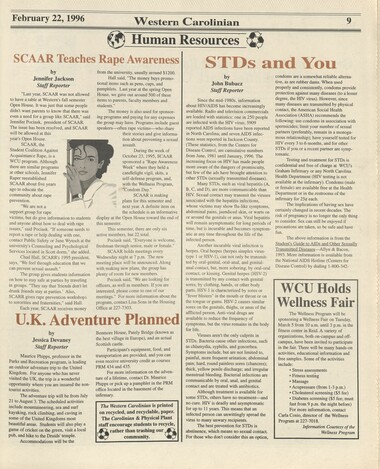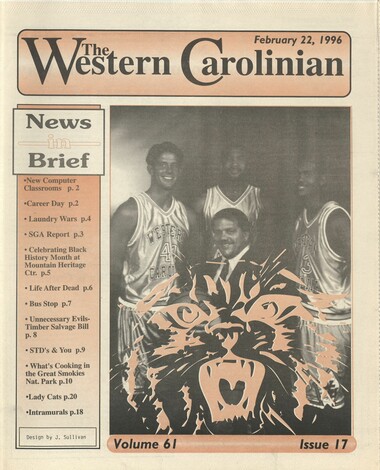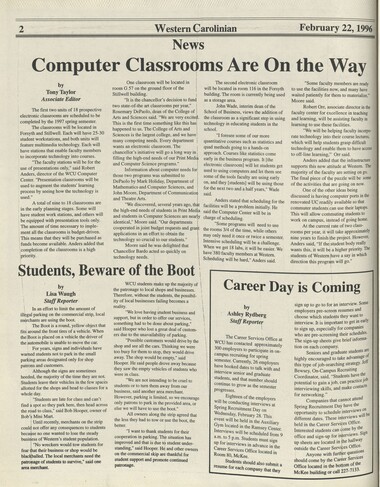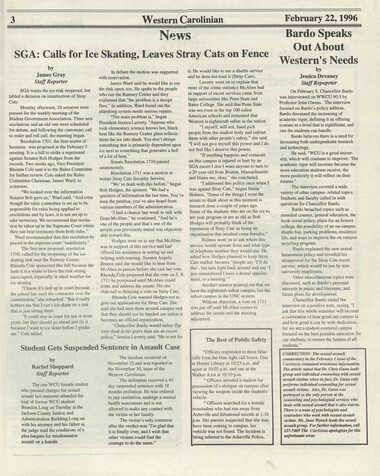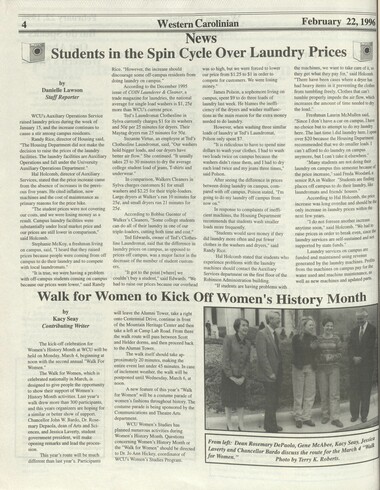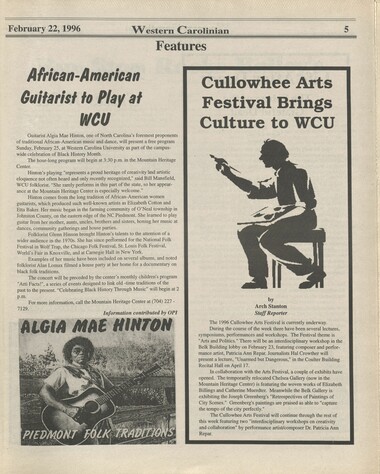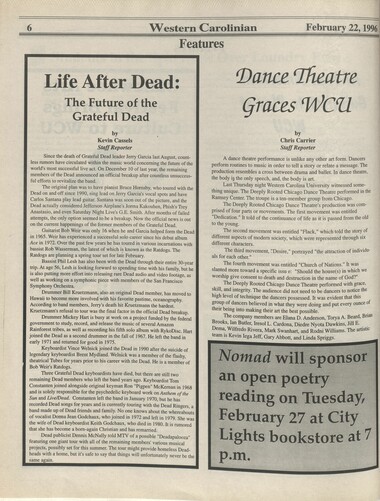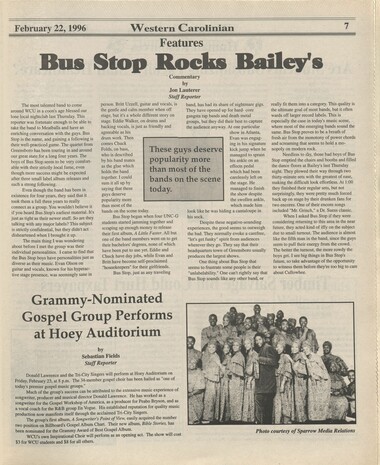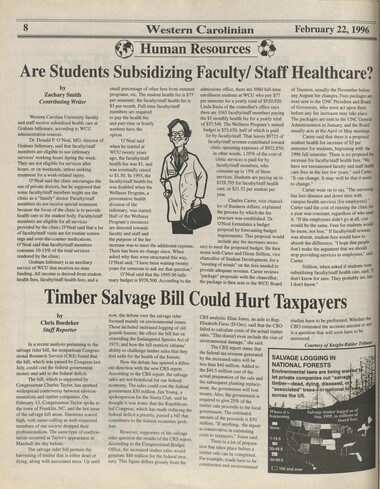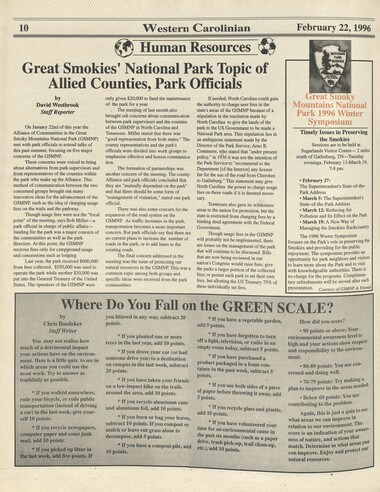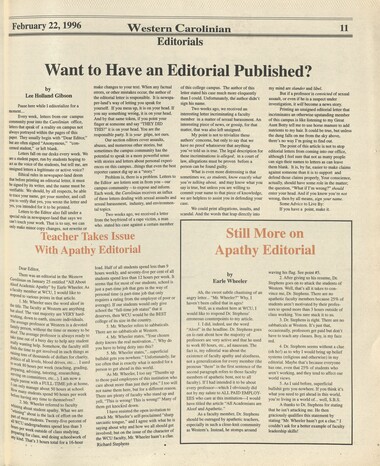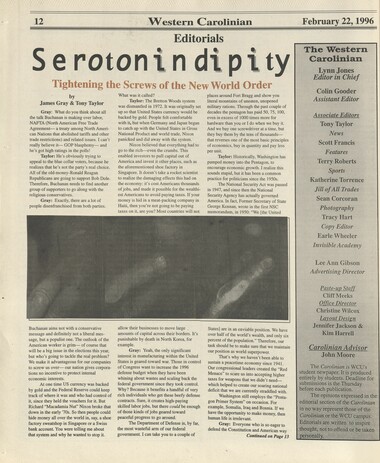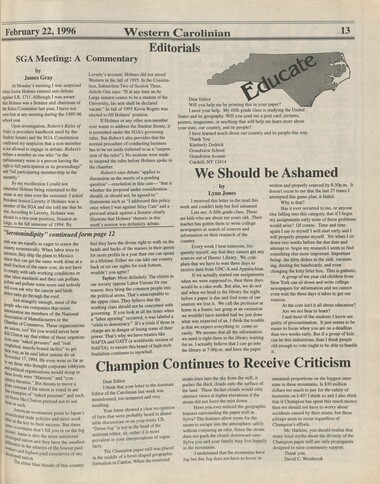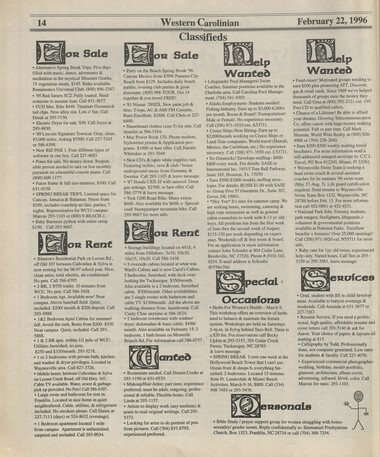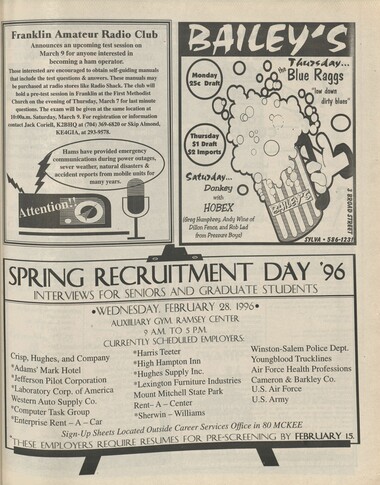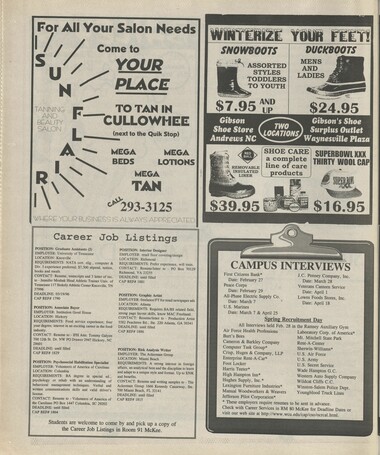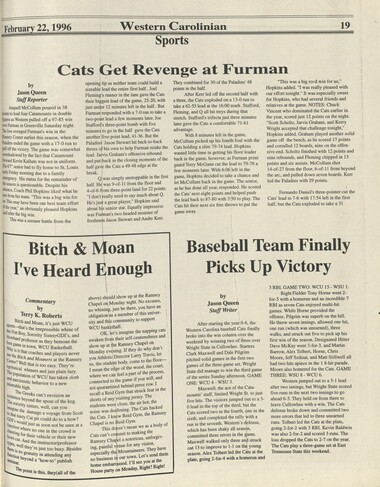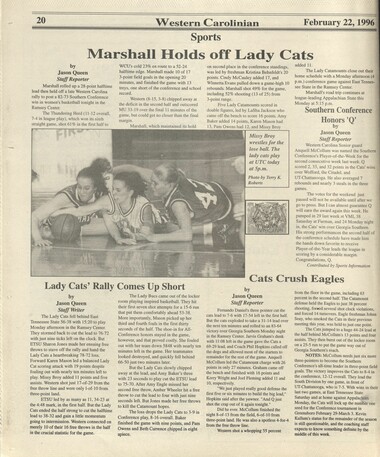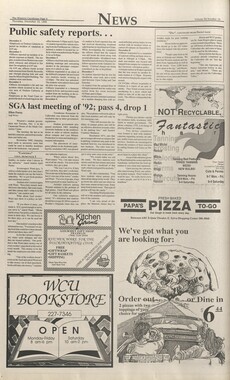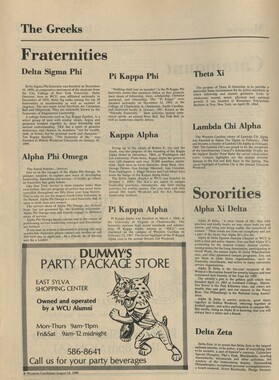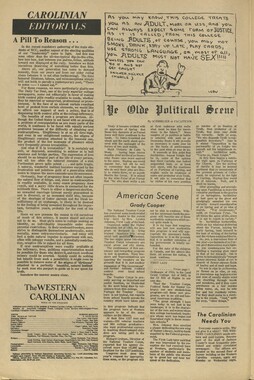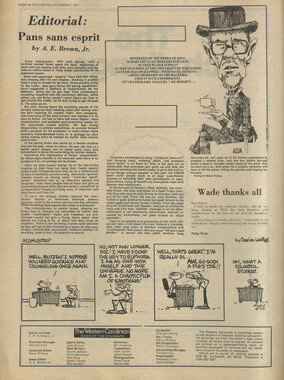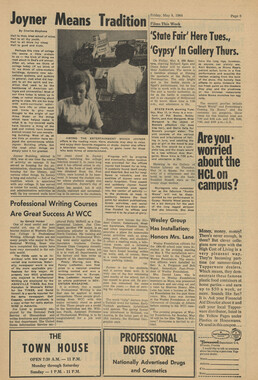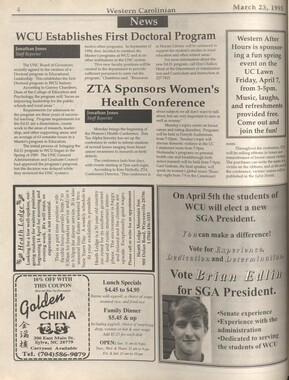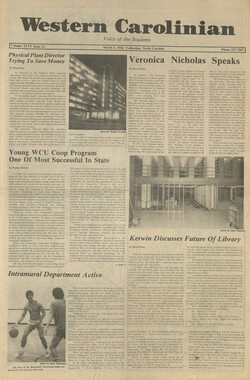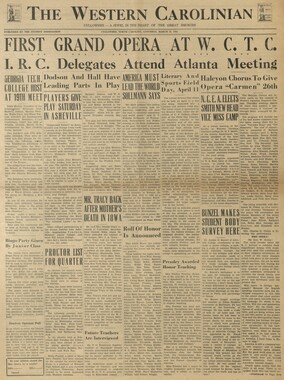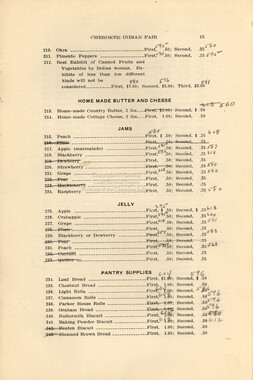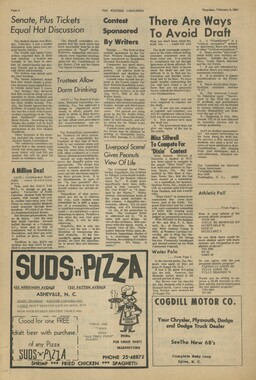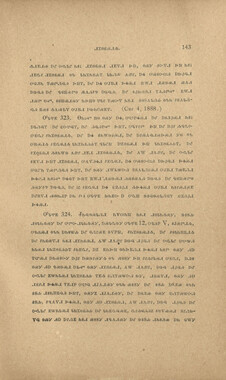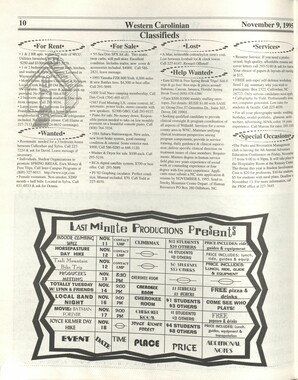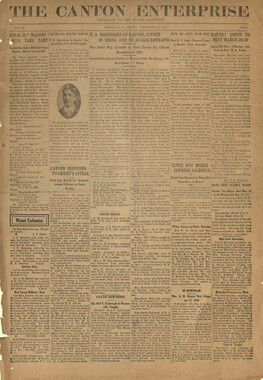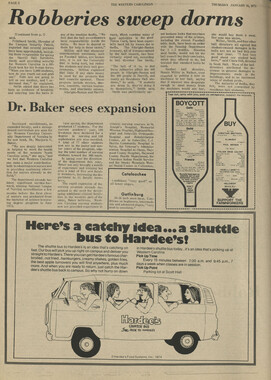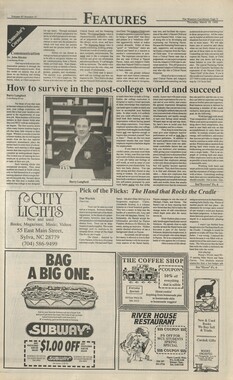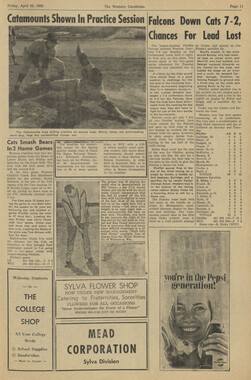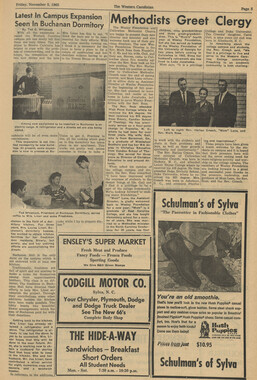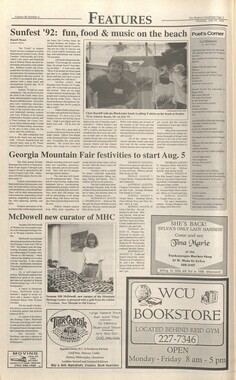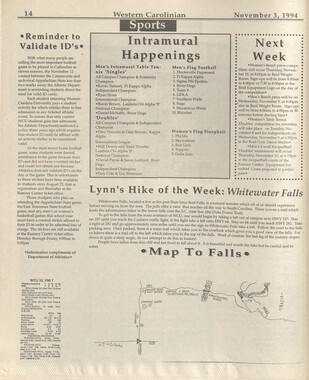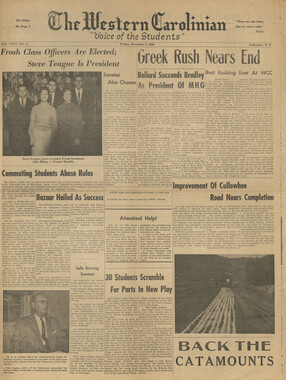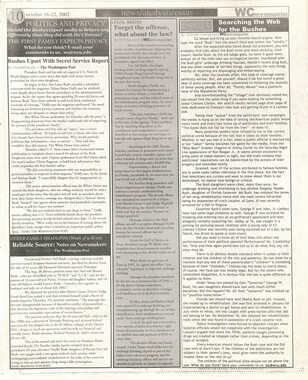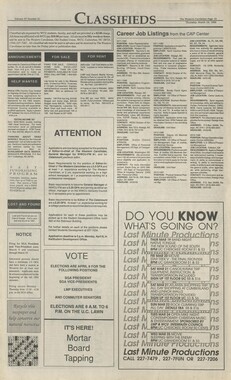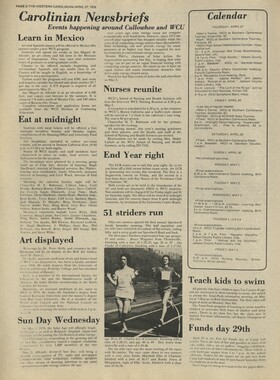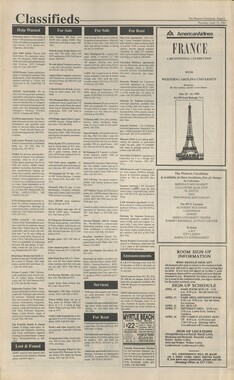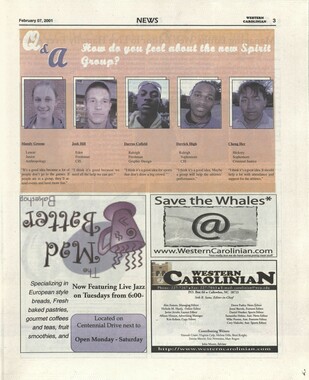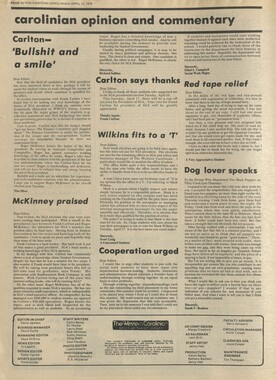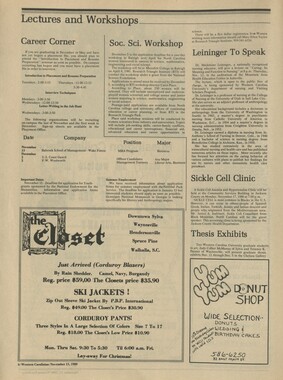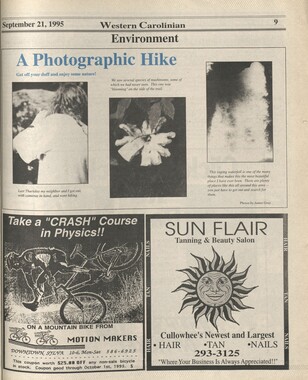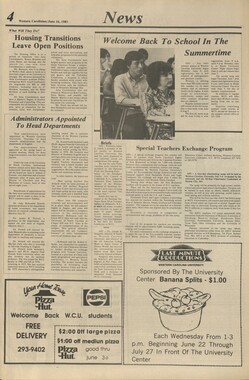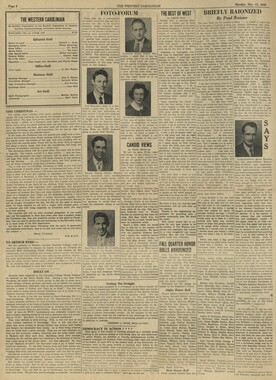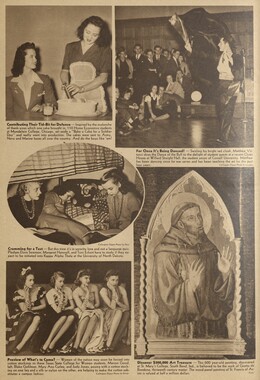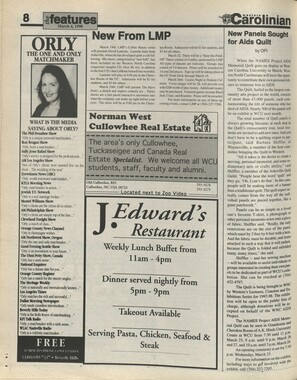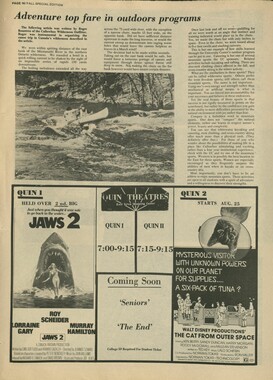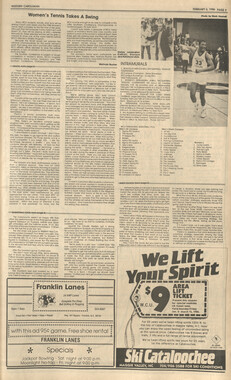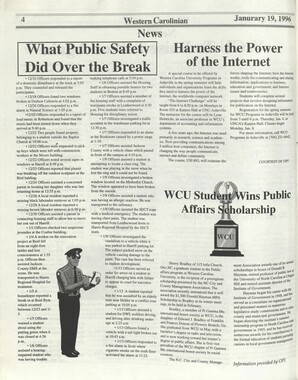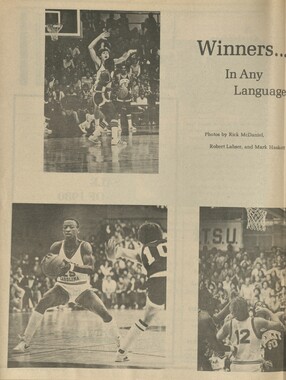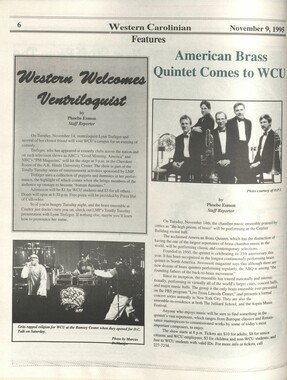Western Carolina University (20)
View all
- Canton Champion Fibre Company (2308)
- Cherokee Traditions (292)
- Civil War in Southern Appalachia (165)
- Craft Revival (1942)
- Great Smoky Mountains - A Park for America (2766)
- Highlights from Western Carolina University (430)
- Horace Kephart (941)
- Journeys Through Jackson (154)
- LGBTQIA+ Archive of Jackson County (83)
- Oral Histories of Western North Carolina (314)
- Picturing Appalachia (6772)
- Stories of Mountain Folk (413)
- Travel Western North Carolina (160)
- Western Carolina University Fine Art Museum Vitreograph Collection (129)
- Western Carolina University Herbarium (92)
- Western Carolina University: Making Memories (708)
- Western Carolina University Publications (2283)
- Western Carolina University Restricted Electronic Theses and Dissertations (146)
- Western North Carolina Regional Maps (71)
- World War II in Southern Appalachia (131)
University of North Carolina Asheville (6)
View all
- Allanstand Cottage Industries (62)
- Appalachian National Park Association (53)
- Bennett, Kelly, 1890-1974 (1388)
- Berry, Walter (76)
- Brasstown Carvers (40)
- Carver, George Washington, 1864?-1943 (26)
- Cathey, Joseph, 1803-1874 (1)
- Champion Fibre Company (233)
- Champion Paper and Fibre Company (297)
- Cherokee Indian Fair Association (16)
- Cherokee Language Program (22)
- Crowe, Amanda (40)
- Edmonston, Thomas Benton, 1842-1907 (7)
- Ensley, A. L. (Abraham Lincoln), 1865-1948 (275)
- Fromer, Irving Rhodes, 1913-1994 (70)
- George Butz (BFS 1907) (46)
- Goodrich, Frances Louisa (120)
- Grant, George Alexander, 1891-1964 (96)
- Heard, Marian Gladys (60)
- Kephart, Calvin, 1883-1969 (15)
- Kephart, Horace, 1862-1931 (313)
- Kephart, Laura, 1862-1954 (39)
- Laney, Gideon Thomas, 1889-1976 (439)
- Masa, George, 1881-1933 (61)
- McElhinney, William Julian, 1896-1953 (44)
- Niggli, Josephina, 1910-1983 (10)
- North Carolina Park Commission (105)
- Osborne, Kezia Stradley (9)
- Owens, Samuel Robert, 1918-1995 (11)
- Penland Weavers and Potters (36)
- Roberts, Vivienne (15)
- Roth, Albert, 1890-1974 (142)
- Schenck, Carl Alwin, 1868-1955 (1)
- Sherrill's Photography Studio (2565)
- Southern Highland Handicraft Guild (127)
- Southern Highlanders, Inc. (71)
- Stalcup, Jesse Bryson (46)
- Stearns, I. K. (213)
- Thompson, James Edward, 1880-1976 (226)
- United States. Indian Arts and Crafts Board (130)
- USFS (683)
- Vance, Zebulon Baird, 1830-1894 (1)
- Weaver, Zebulon, 1872-1948 (58)
- Western Carolina College (230)
- Western Carolina Teachers College (282)
- Western Carolina University (1794)
- Western Carolina University. Mountain Heritage Center (18)
- Whitman, Walt, 1819-1892 (10)
- Wilburn, Hiram Coleman, 1880-1967 (73)
- Williams, Isadora (3)
- Cain, Doreyl Ammons (0)
- Crittenden, Lorraine (0)
- Rhodes, Judy (0)
- Smith, Edward Clark (0)
- Appalachian Region, Southern (2568)
- Asheville (N.C.) (1917)
- Avery County (N.C.) (26)
- Blount County (Tenn.) (161)
- Buncombe County (N.C.) (1671)
- Cherokee County (N.C.) (283)
- Clay County (N.C.) (555)
- Graham County (N.C.) (233)
- Great Smoky Mountains National Park (N.C. and Tenn.) (514)
- Haywood County (N.C.) (3523)
- Henderson County (N.C.) (70)
- Jackson County (N.C.) (4694)
- Knox County (Tenn.) (25)
- Knoxville (Tenn.) (12)
- Lake Santeetlah (N.C.) (10)
- Macon County (N.C.) (420)
- Madison County (N.C.) (212)
- McDowell County (N.C.) (39)
- Mitchell County (N.C.) (132)
- Polk County (N.C.) (35)
- Qualla Boundary (981)
- Rutherford County (N.C.) (76)
- Swain County (N.C.) (2115)
- Transylvania County (N.C.) (270)
- Watauga County (N.C.) (12)
- Waynesville (N.C.) (84)
- Yancey County (N.C.) (72)
- Aerial Photographs (3)
- Aerial Views (60)
- Albums (books) (4)
- Articles (1)
- Artifacts (object Genre) (228)
- Bibliographies (1)
- Biography (general Genre) (2)
- Cards (information Artifacts) (38)
- Clippings (information Artifacts) (191)
- Crafts (art Genres) (622)
- Depictions (visual Works) (21)
- Design Drawings (1)
- Drawings (visual Works) (184)
- Envelopes (73)
- Facsimiles (reproductions) (1)
- Fiction (general Genre) (4)
- Financial Records (12)
- Fliers (printed Matter) (67)
- Glass Plate Negatives (381)
- Guidebooks (2)
- Internegatives (10)
- Interviews (815)
- Land Surveys (102)
- Letters (correspondence) (1013)
- Manuscripts (documents) (618)
- Maps (documents) (177)
- Memorandums (25)
- Minutes (administrative Records) (59)
- Negatives (photographs) (5835)
- Newsletters (1285)
- Newspapers (2)
- Occupation Currency (1)
- Paintings (visual Works) (1)
- Pen And Ink Drawings (1)
- Periodicals (193)
- Personal Narratives (10)
- Photographs (12976)
- Plans (maps) (1)
- Poetry (6)
- Portraits (1961)
- Postcards (329)
- Programs (documents) (151)
- Publications (documents) (2236)
- Questionnaires (65)
- Scrapbooks (282)
- Sheet Music (2)
- Slides (photographs) (402)
- Songs (musical Compositions) (2)
- Sound Recordings (796)
- Specimens (92)
- Speeches (documents) (15)
- Tintypes (photographs) (8)
- Transcripts (322)
- Video Recordings (physical Artifacts) (23)
- Vitreographs (129)
- Text Messages (0)
- A.L. Ensley Collection (275)
- Appalachian Industrial School Records (7)
- Appalachian National Park Association Records (336)
- Axley-Meroney Collection (2)
- Bayard Wootten Photograph Collection (20)
- Bethel Rural Community Organization Collection (7)
- Blumer Collection (5)
- C.W. Slagle Collection (20)
- Canton Area Historical Museum (2110)
- Carlos C. Campbell Collection (282)
- Cataloochee History Project (64)
- Cherokee Studies Collection (4)
- Daisy Dame Photograph Album (5)
- Daniel Boone VI Collection (1)
- Doris Ulmann Photograph Collection (112)
- Elizabeth H. Lasley Collection (1)
- Elizabeth Woolworth Szold Fleharty Collection (4)
- Frank Fry Collection (95)
- George Masa Collection (173)
- Gideon Laney Collection (452)
- Hazel Scarborough Collection (2)
- Hiram C. Wilburn Papers (28)
- Historic Photographs Collection (236)
- Horace Kephart Collection (861)
- Humbard Collection (33)
- Hunter and Weaver Families Collection (1)
- I. D. Blumenthal Collection (4)
- Isadora Williams Collection (4)
- Jesse Bryson Stalcup Collection (47)
- Jim Thompson Collection (224)
- John B. Battle Collection (7)
- John C. Campbell Folk School Records (80)
- John Parris Collection (6)
- Judaculla Rock project (2)
- Kelly Bennett Collection (1407)
- Love Family Papers (11)
- Major Wiley Parris Civil War Letters (3)
- Map Collection (12)
- McFee-Misemer Civil War Letters (34)
- Mountain Heritage Center Collection (4)
- Norburn - Robertson - Thomson Families Collection (44)
- Pauline Hood Collection (7)
- Pre-Guild Collection (2)
- Qualla Arts and Crafts Mutual Collection (12)
- R.A. Romanes Collection (681)
- Rosser H. Taylor Collection (1)
- Samuel Robert Owens Collection (94)
- Sara Madison Collection (144)
- Sherrill Studio Photo Collection (2558)
- Smoky Mountains Hiking Club Collection (616)
- Stories of Mountain Folk - Radio Programs (374)
- The Reporter, Western Carolina University (510)
- Venoy and Elizabeth Reed Collection (16)
- WCU Gender and Sexuality Oral History Project (32)
- WCU Mountain Heritage Center Oral Histories (25)
- WCU Oral History Collection - Mountain People, Mountain Lives (71)
- WCU Students Newspapers Collection (1744)
- Western North Carolina Tomorrow Black Oral History Project (69)
- William Williams Stringfield Collection (2)
- Zebulon Weaver Collection (109)
- African Americans (390)
- Appalachian Trail (35)
- Artisans (521)
- Cherokee art (84)
- Cherokee artists -- North Carolina (10)
- Cherokee language (21)
- Cherokee pottery (101)
- Cherokee women (208)
- Church buildings (167)
- Civilian Conservation Corps (U.S.) (110)
- College student newspapers and periodicals (1830)
- Dams (105)
- Dance (1023)
- Education (222)
- Floods (61)
- Folk music (1015)
- Forced removal, 1813-1903 (2)
- Forest conservation (220)
- Forests and forestry (1105)
- Gender nonconformity (4)
- Great Smoky Mountains National Park (N.C. and Tenn.) (181)
- Hunting (38)
- Landscape photography (25)
- Logging (117)
- Maps (83)
- Mines and mineral resources (8)
- North Carolina -- Maps (18)
- Paper industry (38)
- Postcards (255)
- Pottery (135)
- Railroad trains (71)
- Rural electrification -- North Carolina, Western (3)
- School integration -- Southern States (2)
- Segregation -- North Carolina, Western (5)
- Slavery (5)
- Sports (452)
- Storytelling (244)
- Waterfalls -- Great Smoky Mountains (N.C. and Tenn.) (66)
- Weaving -- Appalachian Region, Southern (280)
- Wood-carving -- Appalachian Region, Southern (328)
- World War, 1939-1945 (173)
Western Carolinian Volume 61 Number 17
Item
Item’s are ‘child’ level descriptions to ‘parent’ objects, (e.g. one page of a whole book).
-
-
February 22,1996 Western Carolinian Human Resources SCAAR Teaches Rape Awareness by Jennifer Jackson Staff Reporter "Last year, SCAAR was not allowed to have a table at Western's fall semester Open House. It was just that some people didn't want parents to know that there was even a need for a group like SCAAR," said Jennifer Pociask, president of SCAAR. The issue has been resolved, and SCAAR will be allowed at this year's Open House. SCAAR, the Student Coalition Against Acquaintance Rape, is a WCU program. Although there are similar programs at other schools, Jennifer Raper reestablished SCAAR about five years ago to educate the community about rape prevention. "We are not a support group for rape victims, but do give information to students and anyone about how to deal with rape issues," said Pociask. "If someone needs to report a rape or help dealing with one, contact Public Safety or June Wytoch at the university's Counseling and Psychological Services located in Scott dorm," she added. Chad Hall, SCARR's 1995 president, says, "We feel through education that we can prevent sexual assault." The group gives students information on how to stay safe at parties by traveling in groups. "They say that 'friends don't let drunk friends stay at parties.' Also, SCARR gives rape prevention workshops to sororities and fraternities," said Hall. Each year, SCAAR receives money from the university, usually around $1200. Hall said, "The money buys promotional items such as pens, cups, and pamphlets. Last year at the spring Open House, we gave out around 500 of these items to parents, faculty members and students." The money is also used for sponsoring programs and paying for any expenses the group may have. Programs include guest speakers—often rape victims—who share their stories and give information about preventing a sexual assault. During the week of October 23, 1995, SCAAR sponsored a "Rape Awareness Week" where they held a candlelight vigil, skits, a self-defense program, and, with the Wellness Program, / "Condom Day." SCAAR is making plans for this semester and next year. A definite item on the schedule is an informative display at the Open House toward the end of this semester. This semester, there are only six active members, but 22 total. Pociask said, "Everyone is welcome, freshman through senior, male or female." SCAAR holds meetings every Wednesday night at 7 p.m. The new meeting place will be announced. Along with making new plans, the group has plenty of room for new members. Pociask said, "We are looking for officers, as well as members. If you are interested, please come to one of our meetings." For more information about the program, contact Lisa Sons in the Housing Office at 227-7303. U.K. Adventure Planned by Jessica Devaney Staff Reporter Maurice Phipps, professor in the Parks and Recreation program, is leading an outdoor adventure trip to the United Kingdom. For anyone who has never visited the UK, the trip is a wonderful opportunity where you are insured the non- tourist activities. The adventure trip will be from July 21 to August 3. The scheduled activities include mountaineering, sea and surf kayaking, rock climbing, and caving in some of the United Kingdoms most beautiful areas. Students will also play a game of cricket on the green, visit a local pub, and hike to the Druids' temple. Accommodations will be the Benmore House, Pately Bridge (known as the best village in Europe), and an actual Scottish castle. Participant's equipment, food, and transportation are provided, and you can even receive university credit as courses PRM 434 and 435. For more information on the adventure of a lifetime, contact Dr. Maurice Phipps or pick up a pamphlet in the PRM office located in the basement of the infirmary. The Western Carolinian is printed on recycled, and recyclable, paper. The Carolinian & Physical Plant staff encourage students to recycle, rather than trashing our community. STDs and You by John Bubacz Staff Reporter Since the mid-1980s, information about HIV/AIDS has become increasingly available. Radio and television commercials are loaded with statistics: one in 250 people are infected with the HIV virus; 5909 reported AIDS infections have been reported in North Carolina; and seven AIDS infections were reported in Jackson County. (These statistics, from the Centers for Disease Control, are cumulative numbers from June, 1981 until January, 1996. The increasing focus on HIV has made people more aware of the dangers of promiscuity, but few of the ads have brought attention to other STDs (sexually transmitted diseases). Many STDs, such as viral hepatitis (A, B, C, and D), are more communicable than HIV. Sexual contact may transmit the viruses associated with the hepatitis infections, whose victims may show flu-like symptoms, abdominal pains, jaundiced skin, or warts on or around the genitals or anus. Viral hepatitis will remain asymptomatic for long periods of time, but is incurable and becomes symptomatic at any time throughout the life of the infected person. Another incurable viral infection is herpes. Oral herpes (herpes simplex virus- type 1 or HSV-1), can not only be transmitted by oral-genital, oral-anal, and genital- anal contact, but, more sobering, by oral-oral contact, or kissing. Genital herpes (HSV-2) is transmitted by any contact with genital sores, by clothing, hands, or other body parts. HSV-1 is characterized by sores or "fever blisters" in the mouth or throat or on the tongue or gums. HSV-2 causes similar sores on the genitals, thighs, or anus of the afflicted person. Anti-viral drugs are available to reduce the frequency of symptoms, but the virus remains in the body for life. Viruses aren't the only culprits in STDs. Bacteria cause other infections, such as chlamydia, syphilis, and gonorrhea. Symptoms include, but are not limited to, painful, more frequent urination; abdominal pain; hard, round painless sores (chancres); thick, yellow penile discharge; and irregular menstrual bleeding. Bacterial infections are communicable by oral, anal, and genital contact and are treated with antibiotics. Although treatment is available for some STDs, others have no treatment—and no cure. HIV is deadly and asymptomatic for up to 11 years. This means that an infected person can unwittingly spread the virus to many unwary recipients. The best prevention for STDs is abstinence, which means no sexual contact. For those who don't consider this an option, condoms are a somewhat reliable alternative, as are rubber dams. When used properly and consistently, condoms provide protection against many diseases (to a lesser degree, the HrV virus). However, since many diseases are transmitted by physical contact, the American Social Health Association (ASHA) recommends the following: use condoms in association with spermicides; limit your number of sexual partners (preferably, remain in a monogamous relationship); have yourself tested for HIV every 3 to 6 months, and for other STDs if you or a recent partner are symptomatic. Testing and treatment for STDs is confidential and free of charge at WCU's Graham Infirmary or any North Carolina Health Department (HIV testing is not available at the infirmary). Condoms (male or female) are available free at the Health Department or in the restrooms of the infirmary for 250 each. The implications of having sex have certainly changed in recent decades. The risk of pregnancy is no longer the only thing to consider. Sex can still be enjoyed if precautions are taken, so be safe and have fun. The above information is from the Student's Guide to AIDs and Other Sexually Transmitted Diseases—Allyn & Bacon, 1993. More information is available from the National AIDS Hotline (Centers for Disease Control) by dialing 1-800-342- WCU Holds Wellness Fair The Wellness Program will be sponsoring a Wellness Fair on Tuesday, March 5 from 10 a.m. until 3 p.m. in the fitness center in Reid. A variety of organizations, both on-campus and off- campus, have been invited to participate in the fair. There will be many hands-on activities, educational information and free samples. Some of the activities include: • Stress assessments • Fitness testing • Massage •Acupressure (from 1-3 p.m.) • Cholesterol screening ($5 fee) • Diabetes screening ($5 fee; must fast from 9 p.m. the night before) For more information, contact Carta Cosio, director of the Wellness Program at 227-7018. Information Courtesy of the Wellness Program
Object
Object’s are ‘parent’ level descriptions to ‘children’ items, (e.g. a book with pages).
-
The Western Carolinian is Western Carolina University's student-run newspaper. The paper was published as the Cullowhee Yodel from 1924 to 1931 before changing its name to The Western Carolinian in 1933.
-
